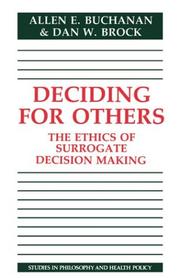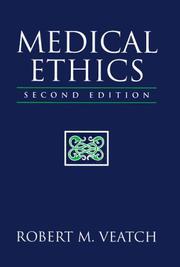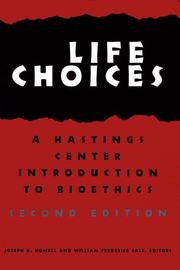| Listing 1 - 8 of 8 |
Sort by
|

ISBN: 0521417856 0521428335 0511625359 9780521417853 9780521428330 Year: 1993 Publisher: Cambridge Cambridge University press
Abstract | Keywords | Export | Availability | Bookmark
 Loading...
Loading...Choose an application
- Reference Manager
- EndNote
- RefWorks (Direct export to RefWorks)
How should modern medicine's dramatic new powers to sustain life be employed? How should limited resources be used to extend and improve the quality of life? In this collection, Dan Brock, a distinguished philosopher and bioethicist and co-author of Deciding for Others (Cambridge, 1989), explores the moral issues raised by new ideals of shared decision making between physicians and patients. The book develops an ethical framework for decisions about life-sustaining treatment and euthanasia, and examines how these life and death decisions are transformed in health policy when the focus shifts from what is best for a patient to what is just for all patients. Professor Brock combines acute philosophical analysis with a deep understanding of the realities of clinical health policy. This is a volume for philosophers concerned with medical ethics, health policy professionals, physicians interested in bioethics, and undergraduate courses in biomedical ethics.
Bioethics --- Ethics, Medical --- Physician-Patient Relations --- Medical ethics --- Ethique médicale --- Collected works --- collected works --- Medical ethics. --- Bioethics. --- Ethics, Medical. --- Physician-Patient Relations. --- #GROL:SEMI-241.63*2 --- Biomedical ethics --- Clinical ethics --- Health care ethics --- Medical care --- Medicine --- Professional ethics --- Nursing ethics --- Social medicine --- Medical Ethics --- Professionalism --- Biomedical Ethics --- Health Care Ethics --- Ethics, Biomedical --- Ethics, Health Care --- Ethicists --- Moral and ethical aspects --- ethics --- Ethique médicale --- Doctor Patient Relations --- Physician Patient Relations --- Physician Patient Relationship --- Doctor-Patient Relations --- Doctor Patient Relation --- Doctor-Patient Relation --- Physician Patient Relation --- Physician Patient Relationships --- Physician-Patient Relation --- Relation, Doctor Patient --- Relation, Doctor-Patient --- Relation, Physician Patient --- Relation, Physician-Patient --- Relations, Doctor Patient --- Relations, Doctor-Patient --- Relations, Physician Patient --- Relations, Physician-Patient --- Relationship, Physician Patient --- Relationships, Physician Patient --- Collected works. --- collected works. --- Arts and Humanities --- Philosophy
Book
Year: 1989 Publisher: Helsinki WIDER
Abstract | Keywords | Export | Availability | Bookmark
 Loading...
Loading...Choose an application
- Reference Manager
- EndNote
- RefWorks (Direct export to RefWorks)
Multi
ISBN: 9780511625350 9780521417853 9780521428330 Year: 1993 Publisher: Cambridge Cambridge University Press
Abstract | Keywords | Export | Availability | Bookmark
 Loading...
Loading...Choose an application
- Reference Manager
- EndNote
- RefWorks (Direct export to RefWorks)

ISBN: 0521311969 052132422X 1139171941 9780521311960 9781139171946 9780521324229 Year: 1989 Publisher: Cambridge : Cambridge University Press,
Abstract | Keywords | Export | Availability | Bookmark
 Loading...
Loading...Choose an application
- Reference Manager
- EndNote
- RefWorks (Direct export to RefWorks)
This book is the most comprehensive treatment available of one of the most urgent - and yet in some respects most neglected - problems in bioethics: decision-making for incompetents. Part I develops a general theory for making treatment and care decisions for patients who are not competent to decide for themselves. It provides an in-depth analysis of competence, articulates and defends a coherent set of principles to specify suitable surrogate decisionmakers and to guide their choices, examines the value of advance directives, and investigates the role that considerations of cost ought to play in decisions concerning incompetents. Part II applies this theoretical framework to the distinctive problems of three important classes of individuals, many of whom are incompetent: minors, the elderly and psychiatric patients. The authors' approach combines a probing analysis of fundamental issues in ethical theory with a sensitive awareness of the concrete realities of health care institutions and the highly personal and individual character of difficult practical problems. Its broad scope will appeal to health professionals, moral philosophers and lawyers alike.
autonomie van de patiënt --- wilsbekwaamheid (wilsbekwame patiënten) --- ethiek (ethische aspecten) --- minderjarigen --- bejaarde --- psychiatrische patient (geesteszieke) --- autonomie du patient --- capacité --- ethique (aspects ethiques) --- mineurs --- personne agée --- patient psychiatrique (malade mentale) --- Medical ethics --- Bioethics --- Medical jurisprudence --- Decision making --- Decision making. --- Moral and ethical aspects --- #GBIB:CBMER --- Forensic medicine --- Injuries (Law) --- Jurisprudence, Medical --- Legal medicine --- Biomedical ethics --- Clinical ethics --- Ethics, Medical --- Health care ethics --- Medical care --- Medicine --- Deciding --- Decision (Psychology) --- Decision analysis --- Decision processes --- Making decisions --- Management --- Management decisions --- Biology --- Life sciences --- Life sciences ethics --- Moral and ethical aspects&delete& --- Forensic sciences --- Medical laws and legislation --- Professional ethics --- Nursing ethics --- Social medicine --- Choice (Psychology) --- Problem solving --- Science --- Arts and Humanities --- Philosophy --- Medical ethics - United States - Decision making. --- Bioethics - United States - Decision making. --- Medical jurisprudence - Moral and ethical aspects - United States - Decision making. --- Decision making - Moral and ethical aspects - United States.


ISBN: 0867209747 Year: 1997 Publisher: Boston Jones and Bartlett
Abstract | Keywords | Export | Availability | Bookmark
 Loading...
Loading...Choose an application
- Reference Manager
- EndNote
- RefWorks (Direct export to RefWorks)
Fourteen leading authorities in their respective fields provide the most comprehensive and current survey of issues in medical ethics ever written. Each author is given the opportunity to write a chapter surveying a critical issue in one of the major subject areas in medical ethics. Within each chapter, the author develops a discussion of the critical concepts, arguments and positions in a particular facet of medical ethics, without arguing for one position or another. Since the first edition of Medical Ethics in 1989, important changes have occurred that affect every chapter in this book. To address these changes, Robert Veatch has asked the original contributors to address the developments of the past six years. Additionally, Ronald Bayer has contributed an new chapter on AIDS and ethics. Norman Daniels, former member of the ethics advisory group for President Clinton's Health Care Task Force, provides a framework for understanding the ethical dimension of the health care policy debate.
Book

ISBN: 9780199570539 Year: 2009 Publisher: Oxford Clarendon
Abstract | Keywords | Export | Availability | Bookmark
 Loading...
Loading...Choose an application
- Reference Manager
- EndNote
- RefWorks (Direct export to RefWorks)
In these twelve papers notable ethicists use the resources of ethical theory to illuminate important theoretical and practical topics, including the nature of public health, notions of community, population bioethics, the legitimate role of law, the use of cost-effectiveness as a methodology, vaccinations, and the nature of infectious disease. Public health is an important and fast-developing area of ethical discussion. In this volume a range of issues in public health ethics are explored using the resources of moral theory, political philosophy, philosophy of science, applied ethics, law, and economics. The twelve original papers presented consider numerous ethical issues arise within public health ethics. To what extent can the public good or the public interest justify state interventions that impose limits upon the freedom of individuals? What role should the law play in regulating risks? Should governments actively aim to change our preferences about such things as food, smoking or physical exercise? What are public goods, and what role (if any) do they play in public health? To what extent do individuals have moral obligations to contribute to protecting the community or the public good? Where is it appropriate to concentrate upon prevention rather than cure? Given the fact that we cannot be protected from all harm, what sorts of harm provide a justification for public health action? What limits do we wish to place upon public health activities?How do we ensure that the interests of individuals are not set aside or forgotten in the pursuit of population benefits? An excellent line-up of authors from North America, Europe, and the UK tackle these questions.
Book

ISBN: 9780199546596 0199546592 9786611925413 1281925411 0191563021 9780191563027 0191609404 1383045275 Year: 2008 Publisher: Oxford Clarendon Press
Abstract | Keywords | Export | Availability | Bookmark
 Loading...
Loading...Choose an application
- Reference Manager
- EndNote
- RefWorks (Direct export to RefWorks)
The ethics of medical care and biomedical research are rapidly becoming global. This volume gathers leading bioethicists to explore many new questions raised by the internationalisation of medical care and biomedical research.
General ethics --- anno 1900-1999 --- Medical ethics. --- Medicine --- Globalization. --- World health. --- Bioethics. --- Bioethical Issues. --- Ethics, Medical. --- Bioethics --- Biomedical Research --- Global Health --- Research --- Moral and ethical aspects. --- trends. --- ethics. --- bio-ethiek (medische, biomedische ethiek, bio-ethische aspecten) --- internationaal perspectief (mondiale invalshoek) --- bioéthique (éthique médicale, biomédicale, aspects bioéthiques) --- perspective internationale (optique mondiale) --- World Health. --- Globalization --- Medical ethics --- World health --- Global health --- International health --- Public health --- Medical geography --- Clinical sciences --- Medical profession --- Human biology --- Life sciences --- Medical sciences --- Pathology --- Physicians --- Biomedical ethics --- Clinical ethics --- Ethics, Medical --- Health care ethics --- Medical care --- Professional ethics --- Nursing ethics --- Social medicine --- Global cities --- Globalisation --- Internationalization --- International relations --- Anti-globalization movement --- Biology --- Life sciences ethics --- Science --- Research&delete& --- Moral and ethical aspects --- International cooperation --- Bioethical Issues --- World Health --- trends --- ethics --- E-books --- International Health --- Worldwide Health --- International Health Problems --- Health Problem, International --- Health Problems, International --- Health, Global --- Health, International --- Health, World --- Health, Worldwide --- Healths, International --- International Health Problem --- International Healths --- Problem, International Health --- Problems, International Health --- World Health Organization --- Medical Ethics --- Professionalism --- Bioethical Issue --- Issue, Bioethical --- Issues, Bioethical --- Euthanasia --- Human Experimentation --- Patient Rights --- Animal Experimentation --- Health Workforce --- Medicine - Research - Moral and ethical aspects. --- Bioethics - trends. --- Biomedical Research - ethics.


ISBN: 087840757X Year: 2000 Publisher: Washington Georgetown University Press
Abstract | Keywords | Export | Availability | Bookmark
 Loading...
Loading...Choose an application
- Reference Manager
- EndNote
- RefWorks (Direct export to RefWorks)
Medical ethics. --- bio-ethiek (medische, biomedische ethiek, bio-ethische aspecten) --- gezondheidseconomie (gezondheidszorgeconomie) --- abortus (vrijwillige zwangerschapsafbreking) --- levenseinde (einde van het leven, levenseindebeslissing) --- pasgeborene (zuigeling, neonatus, pasgeboren kind) --- euthanasie --- voortplanting (reproductie) --- embryostatuut (moreel statuut van het embryo, juridisch statuut van het embryo, potentiële persoon) --- orgaandonatie --- lichaamsmateriaal (lichaam, menselijk lichaamsmateriaal) --- genetische screening --- genetische engineering (manipulatie) --- kloneren (klonen, therapeutisch kloneren, reproductief kloneren) --- bioéthique (éthique médicale, biomédicale, aspects bioéthiques) --- économie de la santé (économie des soins de santé) --- avortement (interruption volontaire de grossesse, IVG) --- fin de vie (décision de fin de vie) --- nouveau-né --- procréation (reproduction) --- statut de l'embryon (statut moral de l'embryon, statut juridique de l'embryon, personne potentielle) --- don d'organes --- matériel corporel humain, (corps humain) --- dépistage génétique --- génie génétique (ingénierie génétique) --- clonage (clonage thérapeutique, clonage reproductif) --- Medical ethics --- Biomedical ethics --- Clinical ethics --- Ethics, Medical --- Health care ethics --- Medical care --- Medicine --- Bioethics --- Professional ethics --- Nursing ethics --- Social medicine --- Moral and ethical aspects
| Listing 1 - 8 of 8 |
Sort by
|

 Search
Search Feedback
Feedback About UniCat
About UniCat  Help
Help News
News